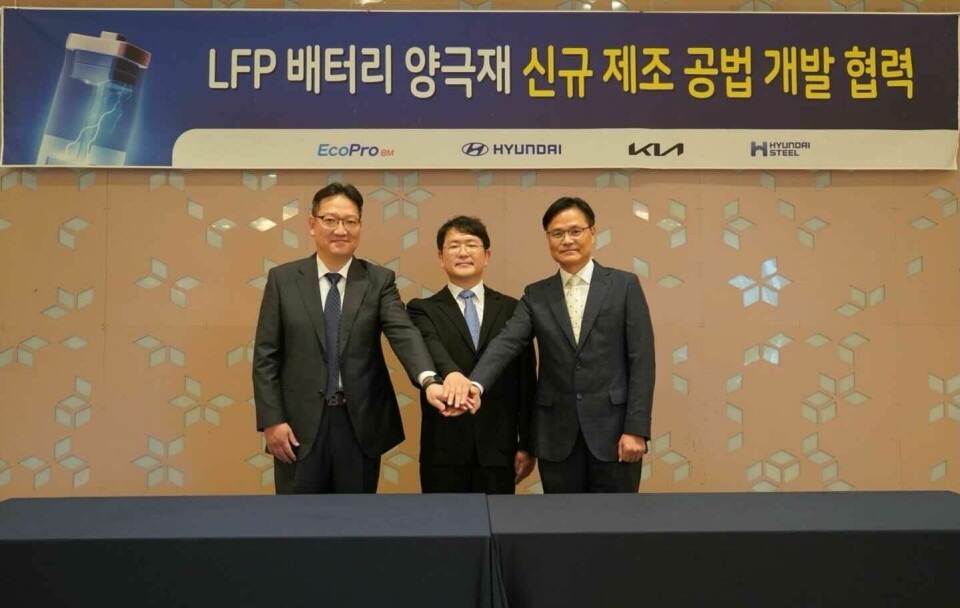Hyundai, Kia, Hyundai Steel, EcoPro BM partner for LFP battery breakthroughs
The Korean consortium aims to eliminate the precursor step in LFP battery cathode material production, reducing emissions and costs. The project, supported by the Korean government, focuses on developing high-purity iron powder and directly synthesised LFP cathode material for improved battery performance.
”The ultimate goal is to create LFP cathode material that enables fast charging technology and exhibits exceptional performance at low temperatures”
Hyundai Motor, Kia, Hyundai Steel, and EcoPro BM have formed a strategic alliance to advance the production of lithium iron phosphate (LFP) battery cathode material. The four-year project, backed by the Korean government, aims to directly synthesise LFP cathode material, bypassing the traditional precursor step and significantly reducing emissions and production costs.

The direct synthesis method is a significant departure from conventional LFP production, which involves adding lithium to precursor materials. By simultaneously adding phosphate, iron powder, and lithium, the project seeks to eliminate the precursor production step altogether, resulting in a more environmentally friendly and cost-effective process.
Hyundai Steel will play a crucial role in developing high-purity fine iron powder processing technology using domestically recycled iron. This technology will then be utilised by EcoPro BM to develop directly synthesised LFP battery cathode material.
The ultimate goal is to create LFP cathode material that enables fast charging technology and exhibits exceptional performance at low temperatures.
The project marks another step forward in the development of EV batteries, as it brings together experts from the steel, battery and automotive sectors. By internalising key technologies, Hyundai Motor and Kia aim to enhance the competitiveness of the Korean EV industry and reduce reliance on foreign imports.
Hyundai’s other recent collborations
Hyundai also recently also recently announced a partnership with Skoda to develop and commercialise hydrogen fuel cell vehicles on a global scale. The companies believe that hydrogen is a key component for achieving sustainable mobility and aim to collaborate on various aspects of hydrogen technology.
The memorandum of understanding (MOU) signed between Hyundai and Skoda is just another in a series of collaborations aimed at expanding the use of hydrogen fuel cells in the automotive industry. The partnership will see Hyundai sharing its fuel cell system and technology with Skoda, enabling the Czech automaker to introduce hydrogen-powered vehicles in markets where it operates.
Beyond mobility applications, Hyundai and Skoda are also exploring the potential of hydrogen fuel cells in other areas, such as stationary power generation and industrial applications. The companies plan to conduct feasibility studies to identify suitable use cases for hydrogen technology.
Hyundai has also partnered with General Motors to explore opportunities in vehicle development, clean energy technologies, and supply chain management. The partnership aims to leverage the combined strengths of both companies to reduce costs, accelerate product development, and offer a wider range of vehicles to customers.


